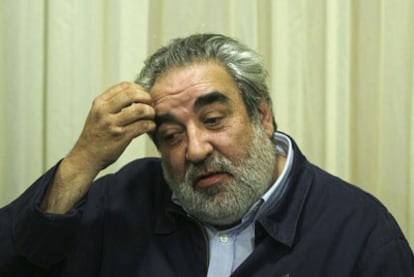"I'd like to build more in Portugal, but there's no work"
Portuguese architect Eduardo Souto de Moura talks about winning the prestigious Pritzker prize and his homeland
Portuguese architect Eduardo Souto de Moura could not have won the prestigious Pritzker Prize at a better time for his country's crippled self-esteem. Winds of crisis - economic, political and social - are blowing fiercely there, and every day sees more citizens packing their bags to seek a better future abroad.
"Winning this prize is good news for all Portuguese people; it will give the ego a little boost. The ceiling is quite low right now," says Souto de Moura over the phone, just 24 hours after being named this year's winner.
"My life won't change at all," he says, although he admits that an award like the Pritzker is always stimulating. "A prize of such scope always helps."
His professional life is unlikely to change that much. The 58-year-old architect certainly cannot complain about a lack of work. His projects include laboratories in Basel, a crematorium in Belgium, two apartment buildings in Bordeaux, the subway system in Naples - "And I've just won a contract in a Middle Eastern country that I can't talk about yet."
As well as all of that, he also teaches at the architecture schools of Porto and Lausanne.
But now that everyone is paying tribute to the victorious architect, his one complaint is that there is a shortage of projects in his home country. "I would like to work more in Portugal. But right now there is nothing to do. Everything is completely on hold," he says. "The future is bleak for young people. An economic crisis at the European and global level, extremely high interest rates... The private sector is not investing, and the public sector has no resources."
Souto de Moura says that the lion's share of the crisis is being borne by the public sector because they have chosen not to start projects in the first place, rather than putting projects on hold.
"Many public projects get 75 percent of funding from the European Union and the other 25 percent from the Portuguese government. But during these times of crisis, both sides have trouble meeting their obligations."
In this difficult scenario, Portugal is left with an excess of architecture schools - the days when the academies in Porto and Lisbon were the sole national reference points are long gone - which churn out around 2,000 architects a year.
The country already has more than 20,000 architects and many make good candidates for the unemployment lines. The alternative, says Souto de Moura, "is to leave for Switzerland or Brazil."
The architect confesses that he was not expecting to win the Pritzker, and that when he got the call he initially thought it was a joke. Instead, he had been hoping to reap the Mies van der Rohe European award for his stadium in Braga, one of his signature projects. The Pritzker seemed out of reach of "the most peripheral country in Europe," and for, in his own words, "the most sedate architect in Portugal."
Yet he is not the first Portuguese national to win the world's most prestigious architecture accolade. The first was Álvaro Siza Vieira, in 1992. These two big names in architecture have worked together on several projects, and have studios in the same building in Porto, with spectacular views of the Douro River.
The critic Ricardo Carvalho wrote that, in his opinion, Souto de Moura's six best projects are Casa Quinta do Lago, Santa María do Bouro Monastery, a house in Moledo, Porto's subway layout, Sporting FC's stadium in Braga and the Paula Rego museum in Cascais - all in Portugal. Yet right now, Souto de Moura only works abroad.
Álvaro Siza, a friend and colleague, was among the first to congratulate the newly crowned winner. "The prize does him justice, and I am overjoyed at the news," said Portugal's other Pritzker winner. "His work shows great rigor. [...] His creations are not isolated pieces, but are part of a larger fabric. His work is architecture with a past and a promising future."

Tu suscripción se está usando en otro dispositivo
¿Quieres añadir otro usuario a tu suscripción?
Si continúas leyendo en este dispositivo, no se podrá leer en el otro.
FlechaTu suscripción se está usando en otro dispositivo y solo puedes acceder a EL PAÍS desde un dispositivo a la vez.
Si quieres compartir tu cuenta, cambia tu suscripción a la modalidad Premium, así podrás añadir otro usuario. Cada uno accederá con su propia cuenta de email, lo que os permitirá personalizar vuestra experiencia en EL PAÍS.
¿Tienes una suscripción de empresa? Accede aquí para contratar más cuentas.
En el caso de no saber quién está usando tu cuenta, te recomendamos cambiar tu contraseña aquí.
Si decides continuar compartiendo tu cuenta, este mensaje se mostrará en tu dispositivo y en el de la otra persona que está usando tu cuenta de forma indefinida, afectando a tu experiencia de lectura. Puedes consultar aquí los términos y condiciones de la suscripción digital.








































